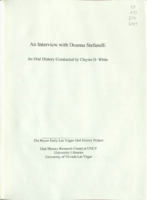Search the Special Collections and Archives Portal
Search Results

Transcript of interview with Roberta Kane by Barbara Tabach, September 6, 2017 and May 22, 2018
Date
Archival Collection
Description
Roberta “Bobbie” Kane (1932 - ) is the first known Jewish child born in Las Vegas. Her parents, Sallie and Mike Gordon, were liquor stores owners and among the founders of the first Jewish congregation in Las Vegas. Bobbie’s childhood remembrances are as a young girl who was fully aware that “Friday nights were reserved for religious services. Saturdays were always reserved for gin rummy.” In the late 1940s, as a teenager at Las Vegas High School (and 1950 graduate), Bobbie recalls Las Vegas as a small town and a joyful place to grow up. She briefly attended University of Southern California before marrying and beginning her family. In time, life brought her back to live with her parents. She pursued a career working for the Desert Inn group of hotels and helped open the Stardust in 1957. She was mentored by Mark Swain, “a six foot-four hunk of a cowboy” who worked for Moe Dalitz. This experience included driving Mark’s pink Cadillac to pick up hotel guests. This provided her with a
Text

Transcript of interview with Frankie Perez by Elsa Lopez and Laurents Bañuelos-Benitez, November 5, 2018
Date
Archival Collection
Description
Frankie Perez (1986- ) is an individual that constantly found himself navigating two worlds, whether it was military versus civilian; female versus male; or being Latinx in the United States. As a result of this navigation, Perez has a unique perspective on our ever more complicated world that not many individuals possess. Perez served in the military during the Do Not Ask, Do Not Tell policy which made it difficult for someone dealing with gender identity, to seek out the proper support they need. Despite the policy, and other policies that were put in place afterwards to inhibit the transgender community in the military, Perez began his transition while still serving his country. In direct contradiction of popular opinion, Perez discovered that the military easily accommodated his transition. Outside of the military Perez is an active voice in the LGBTQ community. As a member of the LGBTQ, Latinx, and military community, Perez has a unique perspective that he uses to fight for both LGBTQ and Latinx rights. Currently, Perez is finishing his degree in gender and sexuality studies at UNLV. He hopes to use his education to help people have the difficult discussions and improve conditions for his communities.
Text

Transcript of interview with Randy Garcia by Laurents Bañuelos-Benitez, November 27, 2018
Date
Archival Collection
Description
Randy Garcia is the founder and CEO of the investment management-consulting firm, The Investment Counsel Company. Born in Los Angeles on Feb. 21, 1954, Garcia’s family moved to Las Vegas in 1957. The son of a World War II vet and a homemaker, Garcia’s ancestral roots come from Mexico, Italy, and Spain. He grew up in Las Vegas during segregation and expansion. He remembers a time when much of city included dirt lots and casinos that no longer stand. A champion in serving under privileged youth and communities across southern Nevada, Garcia lives by the philosophy, “give until it hurts.” Garcia uses his success as a wealth manager to promote, foster, and cultivate positive change for the Latinx community in Las Vegas. His story and dedication to his community is a pinnacle of hope and benevolence for current and future generations. Garcia became the first in his family to attend and graduate college. He graduated from UNLV in 1977 with honors, where he majored in business administratio
Text

Transcript of interview with Deanna Stefanelli by Claytee White, May 3, 2010
Date
Archival Collection
Description
Deanna Stefanelli and her family moved to Las Vegas when her husband John Stefanelli accepted a position as a professor in Food and Beverage at UNLV. She took a part-time job in the admin office of the university's library in 1981. It was also an ideal time for her to return to college to finish her degree. Eventually she became full-time and enjoyed the growth and change of UNLV and the library. Deanna recalls the physical and personnel changes of the library. She describes some of the fun activities that kept them a close work community—from the Friends of the Library to book sales and pancake breakfasts, to a newsletter and learning to make sushi with Myoung-ja Kwon.
Text

Mary Leo interview, February 27, 1980: transcript
Date
Archival Collection
Description
On February 27, 1980, Rafael Reyes-Spindola interviewed Mary Leo (b. Mary Susanne Kaime Leo in 1949 in Santa Barbara, California) about her life growing up in the Las Vegas Valley and her varied career path. Leo, having moved to Las Vegas as a toddler, talks about what the city was like when she arrived, the landscape, schooling and local life in general. She remembers the construction of the University of Las Vegas, Nevada and the growth of the city and population. Through her anecdotes, Leo shares the local attitude towards the Strip that Las Vegans develop as a result of being raised in the city and focuses the beginning half of her interview on life outside of the Strip. The interviewer and Leo move their conversation towards her career path, beginning in a coffee shop at the Riviera Hotel & Casino, her time in the travel industry, as a Las Vegas showgirl in the famed Folies Bergere show, her return to the Riviera as the director of sales and catering, and the legacy she hopes to leave behind with her career.
Text

Transcript of interview with Dale Duane Everett by John Everett, March 7, 1980
Date
Archival Collection
Description
On March 7, 1980, John Everett interviewed his father, cab driver Dale Everett (born January 29, 1924 in Danville, Illinois) at their family home in Las Vegas, Nevada. This interview covers past local historical data. During the interview, Mr. Everett discusses the weather, wildlife, and hunting. He also shares his views on prostitution and gambling in Las Vegas.
Text

Transcript of interview with Ethel S. Hatch by P. Kohlman, November 24, 1975
Date
Archival Collection
Description
On November 24, 1975, collector P. Kohlman interviewed housewife, Ethel S. Hatch (born April 11th, 1914 in Valentine, Texas) in her home in Las Vegas, Nevada. This interview covers the history of Las Vegas from 1939 to 1975. Mrs. Hatch also talks about ranching in Nevada, Rex Bell, development on the Strip, the first hotels, and early local shopping culture. She refers to Block Sixteen as Block Thirteen when discussing the Red Light District. The interview concludes with discussion surrounding tree-lined streets, the Helldorado Club, and Fremont Street.
Text

Transcript of interview with Catherine Hunt by Dennis Hunt, March 2, 1980
Date
Archival Collection
Description
On March 2, 1980, Dennis Hunt interviewed his mother, Catherine Hunt (born August 25, 1932 in Palmyra, Missouri) about her life in Southern Nevada. The two discuss Catherine Hunt’s work as a secretary before becoming a housewife. The interview concludes with Catherine Hunt’s thoughts on population growth, women’s rights, and the Equal Rights Amendment.
Text

Autumn Keyes Ita interview, February 26, 1980: transcript
Date
Archival Collection
Description
From the Ralph Roske Oral History Project on Early Las Vegas, OH-01017. On February 26, 1980, collector Steven McKenzy interviewed Clark County Community College coordinator of rehabilitation, Autumn Keyes Ita (born December 8th, 1936 in Port-au-Prince, Haiti) at the Clark County Community College. This interview offers a personal historical account on home and family life in Las Vegas, Nevada. Autumn also discusses entertainers such as Wayne Newton and Sammy Davis, Jr., and the role that entertainment played in the development of Southern Nevada.
Text

Transcript of interview with Alice Doolittle by Christopher Moran, March 21, 1977
Date
Archival Collection
Description
On March 21, 1977, Christopher Moran interviewed Alice Doolittle (born 1897 in Boston, Massachusetts) about her experiences while living in Nevada. Also present during the interview is Ruth Belding, Alice’s daughter. Doolittle first talks about her reasons for coming to Las Vegas and her eventual occupation as a dental assistant. She also talks about her family’s history of living on the Stewart Ranch and the ranch’s swimming pool that attracted many during the summers of Las Vegas. Doolittle also describes her move to Boulder City with her husband, the first theaters in Las Vegas, and the Union Pacific Railroad. At the end of the interview, the three discuss Helen Stewart, Harley Harmon, and the Doolittle Center, named after Doolittle’s late husband, Ferris Doolittle.
Text
